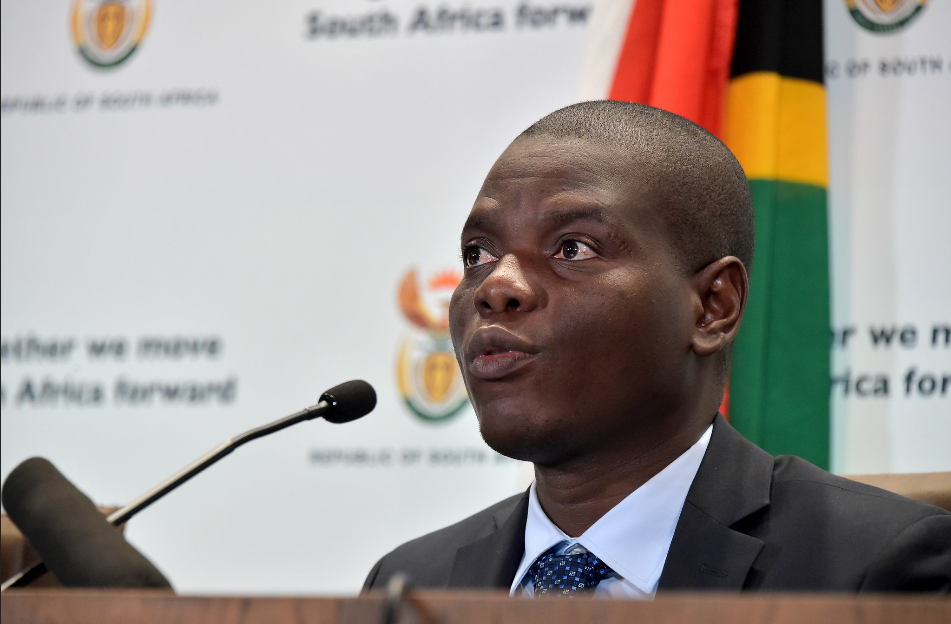JUSTICE and Correctional Services Minister Ronald Lamola says former president Jacob Zuma won’t be getting any preferential treatment in prison, but his incarceration will be dignified throughout his term in line with the UN’s ‘Nelson Mandela Rules’ for prisoners.
The UN General Assembly adopted the rules in 2015 in honour of the late South African president and liberation struggle icon, Nelson Mandela.
Addressing the media outside the Estcourt correctional services centre, Lamola said Zuma would be treated in line with the department’s mandate in line with the ‘Nelson Mandela Rules’.
The rules are aimed at promoting humane conditions of incarceration, raise awareness about inmates being part of society and to value the work done by correctional officials in rehabilitating offenders
The “Nelson Mandela Rules” are based on an obligation to treat all prisoners with respect for their inherent dignity and value as human beings, and to prohibit torture and other forms of ill-treatment.
They also offer detailed guidance on a wide variety of issues ranging from disciplinary measures to medical services.
“Rule 1 of the “Nelson Mandela Rules” is emphatic – all inmates shall be treated with the respect due to their inherent dignity and value as human beings,” said Lamola.
Lamola’s comments after supporters of the former president raised concerns about his treatment in prison.
This after Umkhonto we Sizwe Military Veterans Association (MKMVA) Carl Niehaus’ alleged on Thursday that Zuma was held under terrible and ‘inhumane’ conditions at the Estcourt Correctional Centre.
A criminal case has also been opened after images of the former president inside the Estcourt Correctional Centre surfaced on social media in clear violation of his rights to privacy.
The Department of Correctional Services has opened an investigation and said the photos were allegedly stolen from an SD camera card used to take the photos for institutional filing purposes.
The Human Rights Watch (HRW) and Amnesty International said while the incarceration of Zuma was a reflection of the independence of the judiciary in South Africa, he should be afforded the dignity and values enjoyed by everyone, including access to medical care.
Lamola said Zuma will be held in isolation for two weeks in line with COVID-19 protocols.
He will be assessed by the department’s medical team in conjunction with the South African military service and this will determine the conditions of his incarceration.
Lamola said an assessment has been done to determine the major risks and needs of the offender.
“A complete profile will then be submitted with the recommendations to the Case Management Committee,” said Lamola.
He added that the former president will be eligible for parole after about four months.
Section 82 (1)(a) of the Correctional Services Act also empowers President Cyril Ramaphosa to at any given time, authorize the placement on correctional supervision or parole for any sentenced offender, subject to conditions that may be recommended by the Correctional Supervision and Parole Board.
According to Correctional Services, placement on parole is a decision of the parole boards.
The president’s decision only allow that these low risk offenders be considered for parole by the parole boards.
It is usually done in phases and the most vulnerable, such as those with underlying health problems, elderly [aged above 60 years] and female offenders with infants, are prioritised.
Zuma’s incarceration at the state-of-the-art Estcourt Correctional Centre means he has avoided the crowded and dilapidated conditions most prisoners were subjected to in South Africa.
Zuma arrived at the fairly new, R387 million correctional facility to start his 15-month sentence in the early hours of Thursday morning.
The Estcourt Correctional Centre is a medium-security prison which houses both youth and adult prisoners, and was officially re-opened in May 2019 after R387 million was spent upgrading it..
Built in 1966, it was fully refurbished and re-opened with state-of-the-art facilities.
It also has a hospital section, maintenance workshop, logistics and other support structures.
It is a new generational correctional centre with an approved bed capacity of 512 inmates. It also has a hospital section and a training centre to provide offenders with marketable skills for after their release. Prisoners have access to television and use of public phones.
Mobile phones are prohibited.
Located around 180 kilometres northwest of Durban, Estcourt was given its name in 1863 in honour of Thomas Estcourt, a British parliamentarian who sponsored settlers to migrate there.
- Inside Politics



